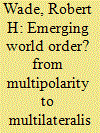| Srl | Item |
| 1 |
ID:
107991


|
|
|
|
|
| Publication |
2011.
|
| Summary/Abstract |
Many developing and transitional countries have grown faster than advanced countries in the past decade, resulting in a shift in the distribution of world income in their favor. China is now the second largest economy in the world, behind the United States and ahead of Japan. As the relative economic weight of China and several others has come to match or exceed that of the middle-ranking G7 economies, the world economy has shifted from "unipolar" toward "multipolar," less dominated by the G7. How is this change being translated into changes in authority and influence within multilateral organizations like the G20, the World Bank, and the International Monetary Fund (IMF)? Alarm bells are ringing in G7 capitals about G7 loss of influence. According to a WikiLeaks cable from the senior U.S. official for the G20 process, from January 2010, "It is remarkable how closely coordinated the BASIC group of countries [Brazil, South Africa, India, China] have become in international fora, taking turns to impede US/EU initiatives and playing the US and EU off against each other."
This essay suggests that the shift in power is much smaller than the headlines or private alarm bells suggest. The United States remains the dominant state, and the G7 states together continue to exercise primacy, but now more fearfully and defensively. China is split between asserting itself as "the wave of the future" and defending itself as too poor to take on global responsibilities (it is roughly 100th in the per capita income hierarchy). The combination of G7 defensiveness and emerging states' jealous guarding of sovereignty produces a spirit of Westphalian assertion in international fora, or "every state for itself." On the assumption that the world economy is in a transitional period, the article suggests reforms in the G20 and the World Bank that would boost their role and legitimacy as multilateral organizations in a more multipolar world.
|
|
|
|
|
|
|
|
|
|
|
|
|
|
|
|
| 2 |
ID:
134485


|
|
|
|
|
| Summary/Abstract |
Why has Piketty's Capital become a publishing sensation? Not for revolutionary findings; its message that western societies have experienced increases in inequality of income and wealth over the long term is hardly new. Of the several reasons discussed in this article, attention is paid in particular to the book's timing and its claim to reveal the laws of income and wealth distribution in western societies. Had the book been published before 2008 it would have been much less successful. Piketty's revelation of the big trends and their underlying logic helps to objectify, legitimize and offer a kind of catharsis for surging middle-class anxieties during the Great Recession. These anxieties have been further intensified by evidence that over 90 per cent of the increase in disposable income in the United States has accrued to the top 1 per cent of the population in the past several years, and a not much lower percentage to the top 1 per cent in Britain. In the conclusion it is argued that if Piketty's forecasts are even remotely accurate, capitalism will lose its core claim to legitimacy.
|
|
|
|
|
|
|
|
|
|
|
|
|
|
|
|